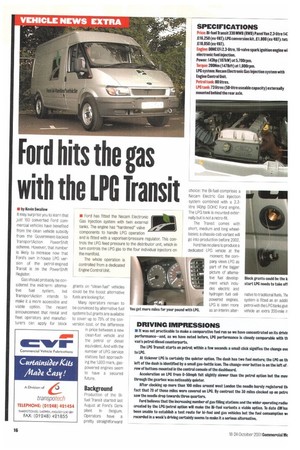Ford hits the gas with the LPG Transit
Page 16

If you've noticed an error in this article please click here to report it so we can fix it.
• by Kevin Swallow It may surprise you to learn that just 160 converted Ford commercial vehicles have benefited from the clean vehicle subsidy from the Government-backed iransportAction PowerShtft scheme. However, that number is likely to increase now that Ford's own in-house LPG version of the petrol-engined Transit is on the PowerShlt Register.
Gas should probably be considered the mid-term alterna tive fuel system, but TransportAction intends to make it a more accessible and viable option. The recent announcement that rental and fleet operators and manufacturers can apply for block • Ford has fitted the Necam Electronic Gas Injection system with twin external tanks. The engine has "hardened" valve components to handle LPG operation and is fitted with a vaporiser/pressure regulator. This controls the LPG feed pressure to the distributor unit, which in turn controls the LPG gas to the four individual injectors on the manifold.
The whole operation is controlled from a dedicated Engine Control Unit, grants on "clean-fuel" vehicles could be the boost alternative fuels are looking for.
Many operators remain to be convinced by alternative fuel systems but grants are available to cover up to 75% of the con version cost, or the difference in price between a new clean-fuel vehicle and the petrol or diesel equivalent. And with the number of LPG service stations fast approaching the 1,000 mark, gaspowered engines seem to have a secured future.
Background
Production of the Bi fuel Transit started last August at Ford's Genk plant in Belgium. Operators have a pretty straightforward choice: the Bi-fuel comprises a Necam Electric Gas Injection system combined with a 2.3litre 145hp DOHC Ford engine. The LPG tank is mounted externally but is not a retro-fit.
The Transit comes with short, medium and long wheelbases; a chassis-cab variant will go into production before 2002.
Ford has no plans to produce a dedicated LPG vehide at the moment; the company views LPG as part of the bi er picture of alternative fuel development which includes electric and hydrogen fuel cellpowered engines. LPG is seen more as an interim alter native to traditional fuels. TN system is fitted as an additi petrol with the LPG tanks give vehicle an extra 200-mile r












































































































































